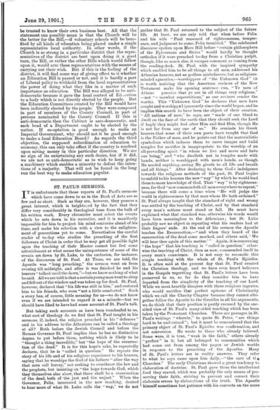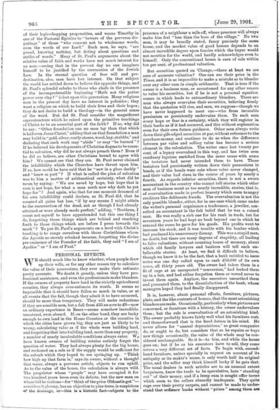ST. PAUL'S SERMONS.
IT is unfortunate that those reports of St. Paul's sermons which have come down to us in the Book of Acts are so few and so short. Such as they are, however, they possess a great interest, which is heightened by the fact that they differ very considerably in theological tone from the bulk of his written work. Every- chronicler must select the events which he sets down in his narrative, and it is manifestly impossible for him to project his mind centuries ahead of his time, and make his selection with a view to the enlighten- ment.of generations yet to come. Nevertholess the careful reader of to-day who studies the preaching of the first followers of Christ in order that he may get all possible light upon the teaching of their Master cannot but feel some a,stonishment at what seems the unimportance of some of the events set down by St. Luke, to the exclusion, for instance, of the discourses of St. Paul. At Troas, we are told, the Apostle was "long preaching," the sermon went on from evening till midnight, and after it was finished he and his hearers "talked until the dawn,"—but we know nothing of what he said. All we are told is that a certain young man went to sleep and fell out of the window and was taken up for dead. St. Paul, however, declared that "his life was still in him," and restored him to his friends, who were "not a little comforted." Such a story has, of course, little meaning for us—we do not know even if we are intended to regard it as a miracle—but we should have liked to have had some account of St. Paul's talk.
But taking such accounts as have been vouchsafed to us, what sort of theology do we find that St. Paul taught in his sermons, if, indeed, the religion preached in his " defences " and in his address to the Athenians can be called a theology at all? Both before the Jewish Council and before the Roman Governor St. Paul implies that he has no distinctive dogma to put before them, nothing which is likely' to be "thought a thing incredible," but "the hope of the resurrec- tion of the dead." It is for this hope's sake, he repeatedly declares, that he is "called in question." He repeats the story of his life and of his religious experience to his hearers, saying that he worships the God of his fathers "after the way that men call heresy," not seeking to overthrow the law and the prophets, but insisting on "the hope towards God, which they themselves also show, that there shall be a resurrection of the dead, both of the just and the unjust." When the Governor, Felix, interested in the new teaching, desired to hear more of what St. Luke calls the "way," we do not
gather that St. Paul returned to the subject of the future life. At least, we are only told that when before Felix and his wife "Paul reasoned of righteousness, temper- ance, and judgment to come, Felix trembled." The celebrated discourse spoken upon Mars Hill before "certain philosophers of the Epicureans and Stoics" would hardly be thought orthodox if it were preached to-day from a Christian pulpit, though, like so much else, it escapes comment as coming from the reading-desk. St. Paul, with the inspired sympathy which enabled him to be all things to all men, addressed his Athenian hearers, not as godless misbelievers, but as religious. minded agnostics,—worshippers of "the Unknown God" (it is worth noticing that the American revisers of the New Testament make his opening sentence run, " Ye men of
Athens perceive that ye are in all things very religious," —not "s linewhat superstitious," as our revisers render the words). This "Unknown God" he declares that men have sought and worship y el ignorantly since the world began, and he implies this search to have been the object of their creation. "AU nations of men," he says, are "made of one blood to dwell on the face of the earth that they should seek the Lord if haply they might feel after Him and find Him, though He is not far from any one of us." He reminds his Greek hearers that some of their own poets have taught that God is the Father of man, and he points out that the materialistic symbolism which induces them to carve images and build temples for sacrifice is inappropriate to the worship of an all-pervading spirit "in whom we live and move and habe our being," and "who dwelleth not in temples made with hands, neither is worshipped with men's hands, as though He needed anything, seeing He giveth to all life and breath and all things." After declaring to them God's indulgence towards the religious methods of the past, St. Paul begins to unfold to his hearers the new " way" by which he would lead them to more knowledge of God. That " way " is by righteous- ness, for God "now commandeth all men everywhere to repent," because there will come a time when "He will judge the world in righteousness by that man whom He bath ordained." St. Paul always taught that the standard of right and wrong was settled by the teaching of Christ, and by that standard every man's actions must stand or fall. He must have explained what that standard was, otherwise his words would have been meaningless to the Athenians ; but St. Luke probably saw no object in repeating what his readers had at their fingers' ends. At the end of his sermon the Apostle teaches the Resurrection,—" and when they heard of the resurrection of the dead some mocked, and others said, 'We will hear thee again of this matter.' " Again, it is concerning "the hope" that his teaching is "called in question," other- wise the teaching of Christ, then as now, commended itself to every man's conscience. It is not easy to reconcile this simple teaching with the • whole of St. Paul's Epistles. It is often said at the present day that St. Paul created the Christian theology, and we have even heard believers in the Gospels regretting that St. Paul's letters have been preserved to us, so far do they consider him to have departed from the simplicity of the teaching of our Lord. While we most heartily disagree with these religious ingrates, who would sacrifice that perfect epitome of Christianity which we call the Charity Chapter because they cannot alto- gether follow the Apostle to the Gentiles in all his arguments, we do think that their position is partly excused by the one- sided view of St. Paul's many-sided teaching which has been taken by the Protestant Churches. There are passages in St. Paul's writings "wherein," to quote St. Peter, "are things hard to be understood"; but it must be remembered that the primary object of St. Paul's Epistles was confirmation, and not conversion. He wrote to those who already believed. Some were, it is true, "weak in the faith," others already " perfect " in it, but all belonged to communities which had come out from among the pagan or Jewish worlds in response to the preaching of the Apostles. Many of St. Paul's letters are in reality answers. They refer to what he says came upon him daily,—" the care of tl e Churches." The early Christians showed a great tendency to elaboration of doctrine. St. Paul gave them the intellectual food they craved, which was probably the only means of pre- serving their faith, striving to prevent and correct their elaborate errors by elaborations of the truth. The Apostle himself sometimes lost patience with his converts on the score
of their logic-chopping propensities, and warns Timothy in one of the Pastoral Epistles to "beware of the perverse dis- putings " of those "who consent not to wholesome words, even the words of our Lord." Such men, he says, "are proud, knowing nothing, but doting about questions and strifes of words." Many of St. Paul's arguments about the relative value of faith and works have not much interest for us now,—seeing that in the present day no one imagines himself to be justified by the ceremonies of the Jewish Law. In the eternal question of free will and pre- destination, also, men have lost interest. On that subject the world has settled down to believe the opposite things, and St. Paul's splendid rebuke to those who chafe in the presence of the incomprehensible beginning " Hath not the potter power over clay?" is lest upon this generation. Many religious men in the present day have no interest in polemics ; they want a religion on which to build their lives and their hopes; they do not desire to build a theology—in the general sense of the word. But did St. Paul consider the magnificent superstructure which be raised upon the primitive teachings of Christ to be an essential part of the faith ? If so, why did he say "Other foundation can no man lay than that which is laid even Jesus Christ," adding that on that foundation a man may build in "gold, silver, costly stones, wood, hay, stubble," and declaring that such work may "abide" or may "be burned " ? If he believed his developments of Christian dogma to be essen- tial to salvation, why did he not always preach them ? Even if he did so believe, are other Christians bound to agree with him? We cannot see that they are. St. Paul never claimed the infallibility which the Churches have thrust upon him. If so, how could he have said that he "saw in a glass darkly" and "knew m part"? If what is called the plan of salvation was to him a matter of arithmetical certainty, what did he mean by saying "We are saved by hope, but hope that is seen is not hope, for what a man seeth now why doth he yet hope for" ? And again, who that for one moment dreamed of his own infallibility could declare, as St. Paul did, that he counted all gains but loss, "if by any means I might attain to the resurrection of the dead, not as though I had already attained or were already made perfect," adding, "Brethren, I count not myself to have apprehended but this one thing I do, forgetting those things which are behind and reaching
forth to those things which are before I press towards the mark " ? To put St. Paul's arguments on a level with Christ's teaching is to range ourselves with those Corinthians whom the Apostle so sternly rebuked because, forgetting the divine pre-eminence of the Founder of the faith, they said "I am of Apollos " or "I am of Paul."





















































 Previous page
Previous page